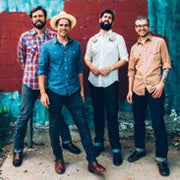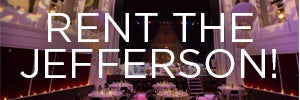Red Wing Roots and WNRN present The Steel Wheels - New Year's Eve Party
with David Wax Museum and Jim Waive & The Young Divorcees
“Few groups have come as far in such a short period of time as The Steel Wheels…” – NPR’s Mountain Stage
“What sets The Steel Wheels from the Blue Ridge Mountains of Virginia apart from many bands is the combination of their stellar instrumentals, accentuated by the one of a kind lead vocal of [Trent] Wagler, and keenly supported by strong harmonies. Eric Brubaker on fiddle, Jay Lapp on mandolin, and Brian Dickel on bass weave in and out intricately throughout this record, painting vivid imagery which flows effortlessly, just teasing the lyrics enough to allow them to resonate within you.” - Country Standard Time
Wild As We Came Here, 2017
Hailing from the Blue Ridge Mountains of Virginia, The Steel Wheels are familiar with the traditions of folk music and how a string band is supposed to sound. In fact, they’ve been drawing on those steadfast traditions for more than a decade. Yet their name also evokes a sense of forward motion, which is clearly reflected in their latest album, Wild As We Came Here.
“I think we’ve always been able to write new songs with different landscapes. However it was really enjoyable for us, creatively and artistically, to depart from the straight-up acoustic sound that we’ve been known for,” says Trent Wagler, who plays guitar and banjo in the band and writes most of the material. “I’m excited to see what happens. There are fans out there who are ready for this and who have been waiting for us to do this.”
While on tour supporting Josh Ritter, the band forged a friendship with Sam Kassirer, who plays keyboards for Ritter on tour and has produced a number of his albums. While The Steel Wheels had been considering other producers and maybe recording in Nashville, they chose to follow their instincts all the way to rural Maine, where Kassirer owns a recording studio inside a renovated farmhouse from the 18th century. All four band members – Wagler, Eric Brubaker (fiddle), Brian Dickel (upright bass), and Jay Lapp (mandolin) – hunkered down for a week and a half to create Wild As We Came Here.
“It’s a gorgeous set-up,” Wagler says. “I didn’t grow up in a big city and I never made a record in a big city. It’s much more my style, and our style as a band, to completely hole up – probably more than we ever have – for 10 full days in Maine. I left the house for a couple of bike rides but I never went to a restaurant or a store the whole time I was there. We ate on site, we slept on site, and we recorded. It was a very immersive experience, top to bottom.”
Afternoon hikes amid the fall foliage helped them clear their heads, ensuring that everyone could stay focused on the task at hand – which in retrospect was quite daunting. The Steel Wheels had about 40 original songs stowed away before the sessions. Only two or three had ever been played live and the band had not arranged any of them.
“One of my favorite parts of the process was taking the first couple of days to rehearse and arrange the songs all in one room, with Sam offering his insights,” Brubaker says. “We had enough time to really build the songs from the ground up, examining each one to see what elements would best highlight the mood we were trying to capture.”
Wild As We Came Here is a significant leap for the band, which started its journey in 2004. Wagler, Dickel, and Brubaker studied at Eastern Mennonite University in Harrisonburg, Virginia, about an hour from Charlottesville. (All four members of the band grew up in Mennonite families.) Wagler and Dickel were in a punk/alternative band until acoustic music lured them in.
Wagler soon started crafting songs and learned flat-picking. Dickel took classes on building guitars. They briefly played as a duo before Brubaker joined on fiddle. Lapp eventually came on board after getting to know the band from the local folk circuit. In 2010, following a variety of EPs and LPs, the ensemble officially branded itself as The Steel Wheels, a tip of the hat to steam-powered trains, industrial progress, and the buggies of their Mennonite lineage.
Lapp says, “We found we really enjoyed singing and playing music together and it happened so naturally. To make it even better, everyone listens very well to what the other is playing, making it a total group experience. I've never worked with such a collected and well-spoken group of men, and it makes the experience of touring and performing a pure joy.”
Then as now, The Steel Wheels’ style weaves through Americana and bluegrass music, folk and old-time music, and the acoustic poetry of the finest singer-songwriters. By incorporating percussion and keyboards into the sessions for the first time, Wild As We Came Here adds new textures to their catalog, as themes of discovery and perseverance run throughout the collection.
The album begins with “To the Wild,” which explores the fascinating and unusual relationship that modern society has with the great outdoors, from exploitation to preservation. Wagler wrote the title track after reading a news story about a desperate man who starts bidding at a land auction – even though he had no way of paying for it – in order to prevent oil and gas companies from destroying the natural beauty of the area.
Meanwhile, the idea behind “Broken Mandolin” was inspired by a few lines from the Pulitzer Prize-winning novel All the Light We Cannot See, which takes place during World War II. Wagler describes “Take Me to the Ending” as essentially a bluegrass apocalypse – “like a sense of coming out from the bunker and there are still a few people playing fiddle tunes.”
Of course, exquisite harmonies remain a strength of the band, shining through on “Sing Me Like a Folk Song.” By making a social statement in uncertain times, listeners will want to lend their voices too. More than a decade into The Steel Wheels’ career, the simple act of singing together – something that carries them back to their Mennonite heritage – is still incredibly special. The stunning closing track, “Till No One Is Free,” provides an elegant ending to the band’s most satisfying album yet.
“It was my favorite studio experience from start to finish, by far, of any project we’ve ever done,” Dickel says. “A super-relaxed and experimental vibe coupled with some genre-stretching sounds really did it for me. I think we pushed ourselves much further than previous albums and I think we will push our fans a little too. Both of those are exciting to me.”
“Suz and I started this band as friends,” says David Wax, “but now we’re married and have a child and have our family on the road with us. The stakes are different.”
Those stakes are what lie at the heart of David Wax Museum’s fourth and boldest studio album to date, Guesthouse (to be released October 16 on Thirty Tigers). It’s the sound of a band reconciling the accountability of marriage and parenthood with the uncertainty and challenges of life on the road; of coming to terms with the limitations of the “folk” tag that launched their career and pushing past it into uncharted musical territory; of reimagining their entire approach in the studio to capture the magic and the bliss of their live show. In typical David Wax Museum fashion, the songs on Guesthouse are simplistic and sophisticated, elegant and plainspoken all at once. Rather than succumbing to the weight of the newfound responsibilities that landed on their doorstep, the band has leaned into the challenges to capture a brilliant portrait of the messy beauty of it all.
The roots of David Wax Museum stretch back nearly a decade, and all the way from New England to Mexico. As a student at Harvard, Wax began traveling south of the border to study and immerse himself in the country’s traditional music and culture. Back in Boston, he met fiddler/singer Suz Slezak, whose love of traditional American and Irish folk music fused with Wax’s Mexo-Americana into a singular, energetic blend that captivated audiences and critics alike. Their 2010 breakout performance at the Newport Folk Festival made them the most talked-about band of the weekend, with NPR hailing them as “pure, irresistible joy.” They released a trio of albums that earned escalating raves everywhere from SPIN and Entertainment Weekly (who described them as sounding “like Andrew Bird with a Mexican folk bent”) to the New York Times and The Guardian (which dubbed the music “global crossover at its best”). They earned an invitation to return to Newport, this time on the main stage, as well as dates supporting The Avett Brothers, The Carolina Chocolate Drops, Buena Vista Social Club, and more.
It was on the road over these past few years as the band and audiences grew, though, that Wax could feel their exuberant live show evolving beyond its formative roots.
“I felt empowered to start the band because of my time in Mexico studying folk music,” Wax explains. “In Boston, the term ‘Americana’ or ‘folk’ was just this catchall to describe what everyone was doing. It was helpful to use that to talk about our music at first, but we’ve found that our hearts feel most shaken, and the band fires on all cylinders, when we’re putting on a rock show. What we’ve tried to retain about our folk origins is the warm sound of people playing acoustic instruments together in a room. But, by embracing more of an indie rock approach, we’ve colored this record with synthesizers, layers of percussion, and adventurous sonic processing. The mental shift of it helped us feel like we could do anything we wanted. There were no rules that we had to follow in terms of what was ‘authentic.'”
Part of the inspiration for the shift was the presence of guitarist and producer Josh Kaufman, who sat in with the band on tour and added new sounds and textures that the they’d never experimented with before. When it came time to record Guesthouse, the band knew he had to helm it in the studio.
“The songs entered this Technicolor, 3D world with Josh,” explains Wax. “Aside from his contributions to the arrangements, he really wanted us all to be in a room playing the music together live so that the groove would be central. We brought in two other drummers, and there was a real focus on having as much percussion happening at the same time as possible. We gravitate towards that naturally because of the Mexican influences, all of the syncopations and 6/8 dance rhythms and the energy that that gives us, but we really embraced it this time around.”
That emphasis on groove sucks you in from the opening seconds of the kickoff track, “Every Time Katie,” a whispered come-on that roils and pulses like an anxious heartbeat and features gorgeous call and response vocals from David and Suz. It’s followed by “Dark Night Of The Heart,” which pushes the sonic envelope further than any previous David Wax Museum track, blending chamber strings, psychedelic vocal filters, explosive drums, and swirling synthesizers.
Written partially in Mexico and partially in western Massachusetts, the lyrics on Guesthouse find Wax writing with more direct, personal honesty than ever before.
“I had felt really reluctant to talk about personal stuff in the past,” says Wax. “I was writing personally, but there were lots of things I was obfuscating or filtering through a character to protect myself from putting too much out there. But it got to a point where it was taking a lot more energy than it was worth to maintain that privacy. When we had our daughter, Calliope, it felt like this sudden release because talking and singing about our lives was becoming more and more integral to what we were doing as artists and who we were as people.”
The title track, which draws on several traditional Mexican songs for musical inspiration, is a tongue-in-cheek reflection on the life of a traveling musician hunting for a free place to crash, while “Lose Touch With The World” faces down the reality of living a life far removed from that of your friends and family, and “Young Man” is an earnest musing on growing older.
“It’s about being a parent and coming to terms with what your ambition is,” explains Wax. “What part of that is essential to who you are, and what part can you let go of? We have to check in with ourselves and ask what we’re doing and why we’re doing it more often now because we’re not just us putting ourselves through the mental and physical sacrifices of touring anymore,” he continues. “Now Calliope is going through it with us, and Suz’s dad and my cousin Jordan are going through it with us on the road. And because we’re constantly checking and making sure we’re doing this for the right reasons, that we feel honest in our hearts about it, I think that’s brought new life to what we’re doing and a new energy and a new level of commitment.”
It’s a sentiment brought beautifully to life on “Everything Changes,” as Wax and Slezak sing, “Everything changes / when two becomes three.” The song was written in response to all of the good-natured warnings about what having a child would mean for the couple, the freedom and sleep and sanity they might lose out on. Instead, they choose to focus on everything they’ve gained: a beautiful daughter, a stronger bond with their families and fans than ever before, and without a doubt, the most exciting album of their career. For David Wax Museum, the stakes may be higher, but that just means the rewards are even bigger.
Read More
Design VisualSHOWINGS
This event has already occurred.
Jefferson
-
Dec 30 - 31, 2025
Railroad Earth - 2 Night Ticket
-
Tue, Dec 30, 2025
Railroad Earth - Night 1
-
Wed, Dec 31, 2025
Railroad Earth - Night 2
-
Fri, Jan 16, 2026
The Skip Castro Band


